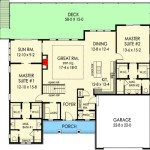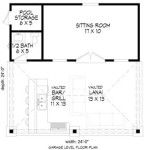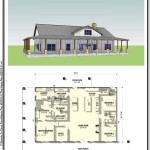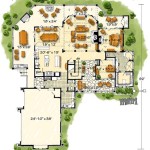Floor Plan of a Dream House
Designing a dream house is an exciting endeavor that requires careful consideration and planning. The floor plan serves as the blueprint for your future home, dictating the layout, flow, and functionality of each space. Here's a detailed guide to help you create the floor plan of your ideal dwelling.
1. Determine the Number of Bedrooms and Bathrooms
Start by defining the number of bedrooms and bathrooms required for your lifestyle. Consider the present and future needs of your family, including guests and potential additions. Determine the ideal size and layout for each bedroom and bathroom, ensuring privacy and convenience.
2. Plan the Living and Dining Spaces
The living room and dining room are central gathering areas. Plan a spacious living room with comfortable seating and ample natural light. The dining room should accommodate the desired number of guests and provide a welcoming atmosphere for meals. Consider an open floor plan to create a seamless flow between these spaces.
3. Design the Kitchen
The kitchen is the heart of the home. Plan a layout that maximizes efficiency and storage. Determine the type of appliances and cabinets you need, and consider the placement of sinks, work surfaces, and a pantry. A kitchen island can provide extra counter space and seating.
4. Incorporate Outdoor Spaces
If space permits, plan for outdoor living areas such as a patio, deck, or balcony. These spaces extend the living area and provide a connection to nature. Design the outdoor spaces to complement the interior decor and ensure privacy.
5. Consider a Home Office or Study
If you work from home or need a space for quiet study, incorporate a home office or study into the floor plan. Plan for a designated work area with ample workspace, storage, and natural light.
6. Plan for Storage
Adequate storage is crucial for a well-organized home. Plan for built-in storage throughout the house, including closets, cabinets, drawers, and shelves. Consider hidden storage solutions to maximize space utilization.
7. Pay Attention to Flow and Transitions
The flow of movement throughout the house is essential for functionality. Ensure seamless transitions between rooms, avoiding awkward angles or narrow passages. Plan for wide hallways and clear pathways to prevent congestion.
8. Consider Lighting and Ventilation
Good lighting and ventilation are crucial for a comfortable and healthy home. Incorporate windows and skylights to maximize natural light. Plan for artificial lighting fixtures to provide adequate illumination in all areas, and include ventilation systems to ensure proper airflow.
9. Think About Accessibility
Consider accessibility needs, especially if you have elderly or disabled family members. Plan for ramps, wider doorways, and accessible bathrooms to ensure comfort and ease of movement.
10. Seek Professional Help if Needed
If you're unsure about designing the floor plan yourself, consider consulting with an architect or home designer. They can provide expert advice, optimize the space, and ensure your dream house meets your specific needs and preferences.
Creating the floor plan of your dream house is a journey filled with both excitement and challenges. By following these guidelines and tailoring them to your unique lifestyle, you can design a home that not only meets your functional needs but also reflects your style and aspirations.

Dream House Plans Find The Home Floor Plan Of Your Dreams

120 Best Dream House Plans Ideas Floor

5 Tips To Build Your Dream Home And Stay On Budget Dfd House Plans Blog

One Story Dream House Plan With Parapet Design Roof

How To Come Up With The Best Floor Plan For Your Dream House Innodez

My Dream House

Dream House Floor Plan Labeled By I Tsarevichalexei13 On Deviantart

Designing Your Own Dream House Ypsilanti District Library

How To Read The Blueprint Of Your Dream Home

Mediterranean Style House Plan 5 Beds 7 Baths 5474 Sq Ft 1017 171 Dreamhomesource Com








